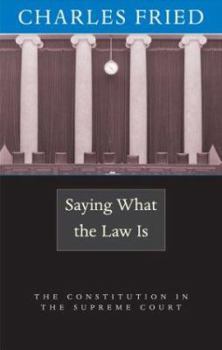Saying What the Law Is: The Constitution in the Supreme Court
Select Format
Select Condition 
Book Overview
In a few thousand words the Constitution sets up the government of the United States and proclaims the basic human and political rights of its people. From the interpretation and elaboration of those... This description may be from another edition of this product.
Format:Hardcover
Language:English
ISBN:0674013026
ISBN13:9780674013025
Release Date:March 2004
Publisher:Harvard University Press
Length:319 Pages
Weight:1.35 lbs.
Dimensions:1.1" x 6.4" x 9.3"
Customer Reviews
1 rating
Law For The Layman... (But Only For The "Right" Layman)
Published by Thriftbooks.com User , 17 years ago
I'm not a lawyer, but I am a citizen of the United States and, as such, I have a vested interest in Constitutional law. Perhaps the same is true of you. If so, you might want to read this book, but read on before coming to that decision. Charles Fried's "Saying What the Law Is," is a look at the development and current state of Constitutional 'doctrine' in a variety of areas, along with Fried's own analysis as to whether or not the current doctrines are strong and likely to last, or whether they may amount to an abberation, subject to overturn at some future date. The book is very scholarly, and I had to proceed slowly--some might take this as a drawback. On the other hand, I wonder how worthwhile such a book would be if it were *not* scholarly, *not* requiring a person to stop, consider and reflect as he read? I suspect that any analysis of Constitutional law worthy of its subject will require a bit of application in the reading. The subject is comprised, after all, of weighty matters, debated over hundreds of years, by incredibly learned men and women. If we have to spend a few minutes more digesting the topics and arguments, that's no knock on Fried and his write-up. That said, and despite the fact that I have no professional background in law, I did not find the book above me at all. Some of the concepts--like stare decisis--were still familiar to me from either some lower division government survey course I'd taken once (or possibly some novel); other concepts, such as the difference between substantive and procedural due process, were new. However, Fried writes intentionally for the layman, and so he explains as he goes. Of course, you have to have a healthy background and interest in certain topics--such as American politics and history and such--to truly appreciate a book like this in context... but then, who, without such a background and interest would be looking at this book in the first place? :) In all, I really enjoyed and appreciated this book. The reading, which could have been frightfully dull, was unexpectedly interesting, especially as Fried peppers his analysis with some personal judgements, some of which are fairly highly-charged. Beyond that, though, the topic has an internal, compelling interest about it--the Constitution is the foundation and framework for the government of my country, and it has stood (often by itself) as a bulwark for the freedoms and liberties that I enjoy in my own life. The Constitution can only do that, however, if it is correctly applied by those encharged to do it--the Supreme Court. While Fried rarely ventures to say what doctine amounts to a "correct" application of the Constitution, and what does not, the arguments discussed revolve around that battle. In short, it is fascinating and often frightening to see how, where and why our liberties are either upheld or abridged, and to try to understand both sides of every argument. Fried does his job in presenting those arguments, and helping us t





